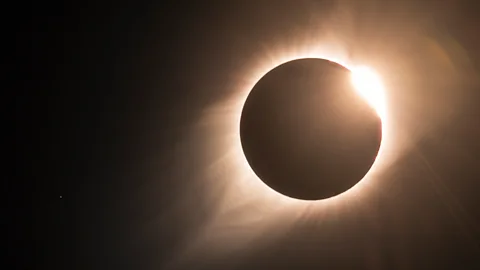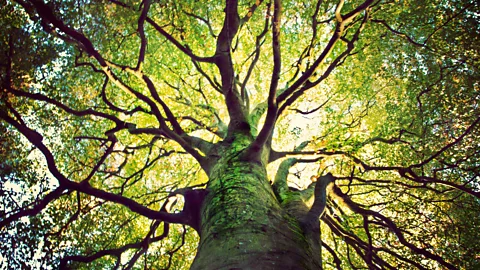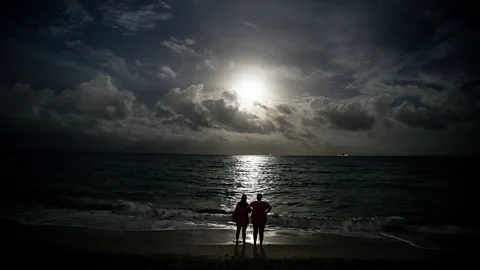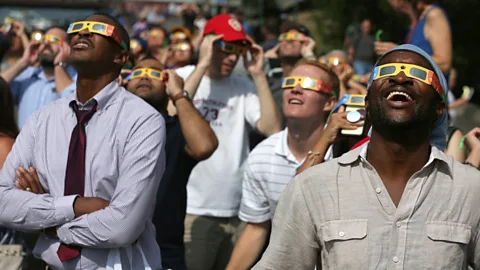How the solar eclipse may affect the brain and bring people together
 Getty Images
Getty ImagesAwe-inspiring cosmological events can powerfully influence our psychology.
The date is 28 May, 585 BC, in what is now present-day Anatolia in Turkey. The Medes, an ancient people from modern-day Iran, and the Lydians – a kingdom from the south of modern-day Turkey – have been fighting for six years. According to the Greek historian Herodotus, the war shows little sign of ending, with neither side making significant progress. It will take a solar eclipse to end the bloodshed.
"Just as the battle was growing warm, day was of sudden changed into night," Herodotus wrote. "The Medes and Lydians, when they observed the change, ceased fighting, and were alike anxious to have terms of peace agreed on."
We may not see such a dramatic reaction to the total eclipse passing across North America on 8 April this year, but recent research suggests it may nevertheless have a powerful impact on our psychology – by evoking the emotion of awe.
There are few events more awe-striking than the series of celestial coincidences that allow us to experience a total solar eclipse. It relies on the Moon being the exact size and distance from Earth, and in the right orbit to pass in front of the Sun and completely block out its light for a few moments. Witnessing such an astonishing event could, according to the research, inspire us all to find greater humility and care for others.
"People may be more affiliative – they may say that they have closer social ties with others – and they feel more connected to their community," says Sean Goldy, a psychologist at Johns Hopkins University, who has investigated the psychological effects of the 2017 eclipse.
The shock of immensity
Long neglected by scientific study, awe has become an increasingly fashionable area of scientific study in the past two decades. It is defined as a sense of wonder and amazement, triggered by a perception of vastness that leaves us feeling small in comparison.
 Getty Images
Getty Images"It's an emotion you feel when you perceive something that is vast and which challenges your view of the world," says Jennifer Stellar, a psychologist at the University of Toronto. "It is the feeling that you have towards an object or a person that is so extraordinary as to be beyond comprehension."
The result can be life-changing. As Dacher Keltner, a psychologist at the University of California of Berkeley, writes in his book Awe, the feeling of wonder can quiet "the nagging, self-critical, overbearing, status-conscious voice of our self, or ego" and it empowers us "to collaborate, to open our minds to wonders, and to see the deep patterns of life".
That's a big claim, but Keltner and his colleagues have accumulated a large body of evidence to support it. In a typical laboratory experiment, psychologists may ask participants to view awe-inspiring videos of natural phenomena before they complete questionnaires and tasks that measure any shift in mindset and behaviour.
Consider a study from 2018 that examined the effects of awe on humility. The research team asked half of their participants to watch a short video that slowly zoomed out from Earth into the wider Universe. The rest watched a relaxing clip that demonstrated how to build a fence. Afterwards, both groups were asked to spend two minutes writing first about their strengths, and then weaknesses. As hypothesised, the participants who had watched the space video were more likely to experience awe, and in their personal statements, they reported significantly fewer strengths before describing their weaknesses – a sign of humility.
In another study from the same research paper, the researchers asked a third of their participants to recall a time when they'd felt awe. Another third remembered a time when they'd been amused by something funny, while the rest recalled an uneventful trip to buy their groceries. The participants then answered a series of questions assessing how much, on a scale of 0 to 100%, various factors had contributed to their life's accomplishments. These included their own talents or external forces such as luck or God.
 Getty Images
Getty ImagesYou would expect that someone with greater humility would be more likely to recognise those external forces – and that's exactly what the researchers discovered for the participants who had been primed to feel awe.
"This makes sense if awe reduces your self-importance and self-focus," says Stellar, who was the first author of the paper. "Our ego guides our perceptions and decision making, but when you feel a self-transcendent emotion like awe, it diminishes the power that it has over you."
Blurred boundaries
Besides making us humbler about our abilities, the shrinking of the ego may also help us to see other people in a new light. "When I have diminished focus on myself, the line between you and me can blur. I might see us as all part of the web of humanity," says Stellar.
Along these lines, researchers asked participants to depict how close they felt to their community. They were given pairs of circles – one of which represented themselves, while the other represented the people around them. The pictures look a little like a Venn diagram, with the amount of overlap representing the strength of the connection to the community and its importance in their overall identity. The method may sound a little arcane, but it is a standard measure of social connection, and after viewing an awe-inspiring video, the participants chose circles with a considerably bigger overlap.
We can see similar effects in a study by S Katherine Nelson-Coffey, a psychologist at the University of New South Wales, Australia, and her colleagues, who asked a group of 47 participants to take a virtual-reality spacewalk, accompanied by an audio clip narrating a text adapted from Carl Sagan's Pale Blue Dot. These participants were considerably more likely to endorse statements such as "I felt closer to others and all of humanity" than another group of people, who had instead looked at a small model of the Earth and Pluto.
Inducing awe can even nudge people towards more altruistic behaviour. Paul Piff, a professor of pscyhology at the University of California, Irvine, and colleagues asked people to watch a clip of the BBC's Planet Earth series. They were subsequently more likely to share tickets for a $100 (£80) raffle, compared to people who had watched scenes from the BBC comedy Walk on the Wild Side.
The eclipsed self
As intriguing as these experiments are, they may not necessarily reflect people's spontaneous reactions to natural phenomena outside of the laboratory – a concern that troubled Sean Goldy as he embarked on his PhD. "I was searching for a way of studying people who were experiencing something really momentous," he says.
 Getty Images
Getty ImagesThe eclipse of 2017 provided an answer. The rare alignment of the Moon and the Sun – resulting in a spectacular corona – seemed highly likely to trigger feelings of awe. Even better, the event was highly likely to inspire posts on social media, which could offer the perfect opportunity to measure their immediate responses to the event.
More like this:
To collect his data, Goldy turned to the social media site formerly known as Twitter. By extracting location details from the users' profiles, Goldy was able to predict which tweeters would have witnessed the total eclipse, and who missed the full spectacle. He then performed linguistic analyses of the text in the posts themselves. Words such as "amazing" or "mind-blowing" were considered to represent awe, for example, while those using cautious language – "maybe", and "perhaps" – represented humility. Pro-sociality, meanwhile, was coded with words such as "care" or "volunteer", as well as terms of gratitude and love.
The results were elegant enough to inspire wonder themselves. The people in the path of the eclipse were about two times more likely to express awe in their tweets. As predicted, this was associated with greater humility and pro-sociality. The effects could also be seen in people's pronouns: the people who were able to witness the eclipse were more likely to use the first-person plural – "we" or "us" – that reflects a collective experience, compared to those outside the eclipse's trajectory.
Goldy emphasises that the effects were relatively short-lived. "It was only within a 24-hour period." But even brief moments of enhanced connection should be a welcome relief from the tensions in our everyday interactions. In this age of polarisation and social division, we can at least find common ground in our amazement at the Universe around us. And that's worth savouring if you manage to witness the spectacle on 8 April.
*David Robson is an award-winning science writer and author. His next book is The Laws of Connection: 13 Social Strategies That Will Transform Your Life. It will be published by Canongate (UK) and Pegasus Books (USA & Canada) in June 2024. He is d_a_robson on Twitter and @davidarobson on Instagram and Threads.
--
If you liked this story, sign up for The Essential List newsletter – a handpicked selection of features, videos and can't-miss news delivered to your inbox every Friday.
